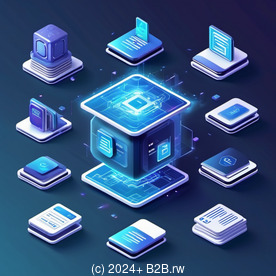
Integration with Accounting Software: Transforming Business Financial Management




Understanding Integration with Accounting Software
The landscape of financial management has evolved remarkably with the advent of advanced accounting software solutions. Integration with platforms like Bill.com, QuickBooks, and Xero is more than just a trend; it's a transformative movement reshaping how businesses manage their finances. With the integration of these platforms, companies are now capable of automating intricate financial processes that were once bogged down by manual labor. This not only leads to efficiency but also enhances the quality and accuracy of financial data.
For example, a mid-sized e-commerce company that previously managed its invoices and payments manually may have taken days to reconcile its accounts. With an integrated system, this same company can automate invoicing, payment processes, and record-keepingcutting down reconciliation time to mere hours. This dramatic reduction in administrative workload allows finance teams to focus more on strategic decision-making rather than mundane data entry tasks.
Furthermore, integration fosters an environment of real-time data access, which is crucial for swift decision-making. With accurate and updated financial information at their fingertips, businesses can react promptly to market changes, evaluate their financial health comprehensively, and make informed decisions that can drive growth.
In the context of e-commerce, where small margins and swift operations are the norms, an integrated financial management system becomes essential. It boosts agility and responsiveness, allowing businesses to stay ahead of competition while ensuring that financial operations align seamlessly with overall business objectives.




Economic Implications of Integration
Delving deeper into the economic implications, integrating tools like Bill.com into existing accounting frameworks offers a multi-faceted approach to improving business efficiency. The cost savings associated with automation are substantial. By replacing manual processes with automated workflows, companies can significantly cut down on labor costs while reassigning personnel to higher-value tasks. For instance, financial analysts can spend more time performing data analysis and forecasting instead of manual data entry and invoice handling.
Another economic advantage lies in enhanced cash flow management. Timely invoicing and payment processes lead to improved cash flow, which is vital for maintaining operational stability. Businesses can ensure they have liquidity to meet their financial obligations and seize new opportunities. In a time where businesses need to be nimble, having a pulse on cash flow can mean the difference between capitalizing on a new business opportunity or missing out due to constrained resources.
The integration also presents an opportunity for businesses to utilize predictive analytics to forecast future financial performance more accurately. Advanced integrated systems can analyze historical data patterns and provide insights into cash flow trends, customer payment behaviors, and typical expenses. With this information, businesses can make proactive decisions, prepare for seasonal fluctuations, and allocate resources more strategically, enhancing overall financial resilience.
Moreover, embracing automated systems positions businesses to benefit from economies of scale. As operations grow, they can expand without a proportional increase in their accounting staff or resources, thus maintaining or increasing profitability as they scale their offerings.




Political and Legal Considerations
Government Policies
In the realm of political considerations, the integration of Bill.com with accounting software enters a complex web of compliance and regulatory responsibilities. Businesses must navigate a myriad of federal, state, and local regulations when it comes to financial reporting, tax obligations, and employee safety regarding finances. The ability of an integrated system to streamline compliance reporting and maintain accurate financial records is crucial. It allows businesses to prepare for audits more effectively and ensures that all financial dealings are above board.
Additionally, as tax legislation evolvesparticularly with growing scrutiny on financial transparencycompanies that leverage integrated solutions are better positioned to adapt to these changes. Automated systems can be pre-set to apply new tax rules or financial reporting requirements, reducing the risk of non-compliance and potential penalties that could arise from inaccurate reporting.
Regulatory Compliance
Beyond taxation, data protection laws such as the General Data Protection Regulation (GDPR) in Europe or the California Consumer Privacy Act (CCPA) necessitate rigorous data management practices. Integrated accounting systems can provide secure methods for storing sensitive financial information while implementing protocols that ensure compliance with these laws, safeguarding not only the company but also its clients and partners.
Understanding the intersection of technology with these legal frameworks can give businesses a competitive advantage. By investing in compliant systems, they not only mitigate risk but also build trust with stakeholders, enabling them to market themselves as responsible corporate entities committed to ethical practices.




Societal and Cultural Impacts
Socially, integrating Bill.com with accounting software significantly influences organizational culture and employee engagement. By automating tedious and repetitive financial tasks, employees can focus on more intellectually stimulating work, which can enhance job satisfaction and productivity. This shift towards value-added tasks helps build a dynamic work environment where innovation is encouraged and creativity is fostered.
Furthermore, integrated systems enhance cross-departmental collaboration by providing a unified database that everyone in the organization can access. This transparency not only fosters accountability but also encourages different teams (marketing, sales, and finance) to work together towards common business goals, leveraging data to support joint efforts.
The accessibility of financial insights can empower employees at all levels to contribute to financial decision-making. As a result, companies can cultivate a culture of knowledge-sharing, where financial literacy becomes inherent across the organization, aligning every employee with the financial objectives of the company.




Technological Advancements Shaping Integration
Technologically, the current evolution toward cloud-based solutions has transformed how businesses perceive and manage their accounting functions. Environmentally, the shift from paper-based processes to digital solutions contributes to sustainability efforts. By reducing paper usage and promoting a paperless office, organizations adopting integration solutions are not only reaping efficiency gains but are also demonstrating corporate responsibility.
Moreover, the use of APIs (application programming interfaces) between Bill.com and applications such as QuickBooks and Xero facilitates a seamless flow of information. This technological architecture minimizes manual interventions and the subsequent risks of errors associated with transferring information between systems. With APIs, businesses can automate their financial data transfer, ensuring consistency and real-time updates across all platforms.
In addition, sophisticated technologies like artificial intelligence and machine learning are fundamentally changing financial management. These technologies can analyze vast amounts of transaction data, identify anomalies, and utilize predictive modeling to provide actionable insights into future financial situations. As a result, businesses can put in place preventive measures to mitigate risks, enhancing their overall resilience.
This technological advancement improves not only efficiency but also the overall quality of insights derived from financial data. Companies that prioritize these innovations can be better prepared to adapt to market changes and drive informed strategies in real time, placing them at the forefront of their industries.




The Importance of Integration in Financial Success
Benefits of Using Bill.com with Accounting Software
The benefits of integrating Bill.com with accounting software like QuickBooks and Xero extend well beyond mere convenience; they redefine how modern businesses approach financial management:
- **Automated Processes**: The elimination of manual data entry minimizes human error and frees up valuable time for finance teams to focus on strategy and analysis.
- **Improved Accuracy**: Automated reconciliation and real-time data syncing reduce discrepancies and foster confidence in financial reports.
- **Cash Flow Optimization**: Automated payment reminders and billing notifications can dramatically enhance cash flow by ensuring timely invoicing and collection.
- **Data Visibility**: Real-time access to financial data allows stakeholders to make quicker and well-informed decisions based on current information.
- **Advanced Reporting**: Integrated systems can generate complex financial reports on demand, offering insights into trends and operational performance.
- **Scalability**: This integrated approach allows businesses to scale operations without being impeded by outdated or cumbersome financial systems.
- **Vendor Management**: Strengthening relationships with vendors and suppliers through timely payments can lead to negotiated terms that benefit the business.
The integrated financial management landscape thus positions businesses proactively, allowing them to not only address current challenges but also anticipate future needs in an ever-changing economic environment.




Conclusion
The integration of Bill.com with accounting software such as QuickBooks and Xero represents a vital evolution in financial management, ultimately reshaping the way businesses conduct their finance-related operations. By adopting these technologies, companies are not just improving efficiency; they are revolutionizing how they approach financial strategies and align them with overall business goals.
As the integration of these advanced systems continues to develop, it is clear that the benefitsfrom enhanced accuracy and compliance to improved cash flow managementare significant and far-reaching. Businesses looking to thrive in today's competitive marketplace must leverage these tools to stay agile, informed, and prepared for any challenges that may arise.
In this regard, investing in integrated accounting solutions is not merely a tactical choice; it is a strategic imperative that will define the financial health and sustainability of any organization. By harnessing the power of technology through seamless integration, businesses not only prepare themselves for success but become pioneers in their fields.
Ready to Enhance Your Financial Management?
If you're looking for a way to optimize your financial operations, the integration of Bill.com with leading accounting software could be exactly what your business needs! Priced at just $749, this service can revolutionize how you manage your financial tasks. Please proceed to our Checkout Gateway and use our Payment Processor to remit a payment of $749. After completing your transaction, we encourage you to get in touch; simply provide us with your payment receipt and your details to arrange your integration service. Thank you for considering us!
